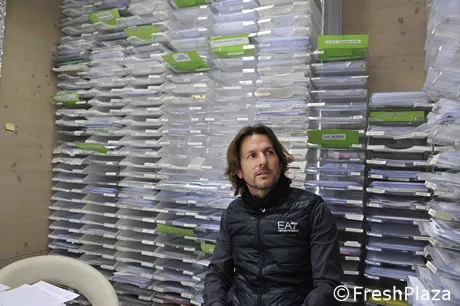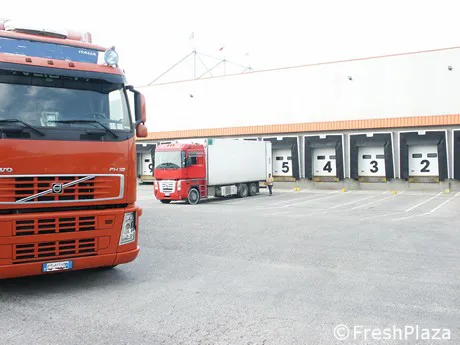Operators took the chance to talk about international issues which have direct consequences on their work. The most popular topics: Trump and populists, Great Britain and Brexit, a non-existent EU, the cost differences penalising operators within EU itself, exiting the Euro, protectionism instead of globalisation and migration flows.
We talked to Leonardo Odorissi, adviser for Fruitimprese Veneto, and we asked for his opinion as regards the recent complaint made by the Associazione Nazionale Imprese Trasporti Automobilistici (Anita) to Comité National Routier (Cnr) and road haulage costs within the EU.

Leonardo Odorizzi in his office.
"The huge difference between road haulage costs is one of the many problems within the EU. For example, the cost in Italy is of €0.43 cents per km, while it is of €0.11 in Bulgaria. And that's not the only difference. There are differences in working hours too. In Lithuania, a driver can work 2,025 hours a year, 1,980 hours in Romania and Poland, 1,900 in Spain, Slovakia and Czech Republic and only 1,800 in Italy."
This of course also has an effect on hourly prices, which range from €28.18 in Italy to €8.01 in Bulgaria.
FreshPlaza (FP): So is there a difference in the distribution of market shares?
Leonardo Odorizzi (LO): There is. In 2014, vehicles registered in Poland worked more, covering 61% of international transports. They were followed by Spain with 35%. Italy only covered 13%.

FP: The lack of uniformity on a European level has led many members to adopt specific norms...
LO: France, Germany, Austria and Belgium have already introduced laws to protect their domestic labour market. It seems as though Italy will do as well. France implemented a protectionist system according to which all foreign business must declare that the contributions they paid are equal to those paid by the French, with a cost of €300 for each incoming vehicle. The situation is intolerable. Shipping a 20 ton truck from Catania to Milan (approx. 1,350 km) costs more than shipping a container with the same load from Genoa to Shanghai (over 11,000 km) and more than shipping the same load from northern Italy to Germany.
FP: Italian operators aren't the only ones who have reason to complain. The 2016 Doing Business report - the annual World Bank report monitoring the ease of doing business in 189 countries - placed Italy in first place on an international level as regards times and costs.
LO: Yes, we do make progress every once in a while. The World Bank also recognised improvements in the resolution of commercial disputes. Italy climbed up to the 111th place from the 147th it occupied in 2015. The improvement was possible thanks to the online justice reform and the Jobs Act.
FP: In Brussels' Eurobarometer, Italy has the lowest number of people favourable to the single currency after Cyprus. What do operators think?
LO: We are worried, to tell you the truth. One doesn't need to be an economist to understand the disastrous consequences of exiting the Euro. Italy's foreign private and public debt amounts to one thousand billion Euro. Exiting the Euro would mean settling the debt with a new devalued currency. It would be terrible for our economy, unless we could avoid paying the debt. The EU and creditor countries would react, though, and they could even close their doors to our businesses.
FP: Italy could face serious problems...
LO: We could have to deal with customs barriers in the first two outlet markets, which determine a considerable surplus to our favour. We export produce for over €50 billion a year to Germany, and France imports Italian products for €40 billion. Safeguarding Italian products with protectionist laws, like Slovenia or Romania do, might be a solution, but we mustn't forget Italy exports half of what it produces. The solution is obviously to level labour costs within the EU.
